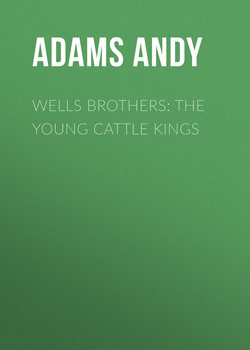Читать книгу Wells Brothers: The Young Cattle Kings - Adams Andy - Страница 6
CHAPTER VI
SUNSHINE AND SHADOW
ОглавлениеAn entire week passed, during which the boys were alone. A few herds were still coming over the trail, but for lack of an advocate to plead, all hope of securing more cattle must be foregone. Forrest had only taken his saddle, abandoning for the present all fixtures contributed for his comfort on arriving at the homestead, including the horses of his employers. The lads were therefore left an abundance of mounts, all cattle were drifted above the ranch, and plans for the future considered.
Winter must be met and confronted. "We must have forage for our saddle horses," said Joel to his brother, the evening after Forrest's departure. "The rain has helped our corn until it will make fodder, but that isn't enough. Pa cut hay in this valley, and I know where I can mow a ton any morning. Mr. Quince said we'd have to stable a saddle horse apiece this winter, and those mules will have to be fed. The grass has greened up since the rain, and it will be no trick at all to make ten to fifteen tons of hay. Help me grind the scythe, and we'll put in every spare hour haying. While you ride around the cattle every morning, I can mow."
A farm training proved an advantage to the boys. Before coming West, their father had owned a mowing machine, but primitive methods prevailed on the frontier, and he had been compelled to use a scythe in his haying operations. Joel swung the blade like a veteran, scattering his swath to cure in the sun, and with whetstone on steel, beat a frequent tattoo. The raking into windrows and shocking at evening was an easy task for the brothers, no day passing but the cured store was added to, until sufficient was accumulated to build a stack. That was a task which tried their mettle, but once met and overcome, it fortified their courage to meet other ordeals.
"I wish Mr. Quince could see that stack of hay," admiringly said Dell, on the completion of the first effort. "There must be five tons in it. And it's as round as an apple. I can't remember when I've worked so hard and been so hungry. No wonder the Texan despises any work he can't do on horseback. But just the same, they're dear, good fellows. I wish Mr. Quince could live with us always. He's surely a good forager."
The demand for range was accented anew. One evening two strangers rode up the creek and asked for a night's lodging. They were made welcome, and proved to be Texas cowmen, father and son, in search of pasturage for a herd of through cattle. There was an open frankness about the wayfarers that disarmed every suspicion of wrong intent, and the brothers met their inquiries with equal candor.
"And you lads are Wells Brothers?" commented the father, in kindly greeting. "We saw your notice, claiming this range, at the trail crossing, and followed your wagon track up the creek. Unless the market improves, we must secure range for three thousand two-year-old steers. Well, we'll get acquainted, anyhow."
The boys naturally lacked commercial experience in their new occupation. The absence of Forrest was sorely felt, and only the innate kindness of the guests allayed all feeling of insecurity. As the evening wore on, the old sense of dependence brought the lads in closer touch with the strangers, the conversation running over the mutual field of range and cattle matters.
"What is the reason," inquired Joel, "that so many cattle are leaving your State for the upper country?"
"The reasons are numerous and valid," replied the older cowman. "It's the natural outgrowth or expansion of the pastoral interests of our State. Before the opening of the trail, for years and years, Texas clamored for an outlet for its cattle. Our water supply was limited, the State is subject to severe drouth, the cattle were congesting on our ranges, with neither market inquiry or demand. The subjection of the Indian was followed by a sudden development of the West, the Texas and Montana cattle trail opened, and the pastoral resources of our State surprised the world. Last year we sent eight hundred thousand cattle over the trail, and they were not missed at home. That's the reason I'm your guest to-night; range has suddenly become valuable in Texas."
"There is also an economic reason for the present exodus of cattle," added the young man. "Our State is a natural breeding ground, but we can't mature into marketable beef. Nearly twenty years' experience has proven that a northern climate is necessary to fatten and bring our Texas cattle to perfect maturity. Two winters in the North will insure a gain of from three to four hundred pounds' extra weight more per head than if allowed to reach maturity on their native heath. This gain fully doubles the value of every hoof, and is a further motive why we are your guests to-night; we are looking for a northern range on which to mature our steer cattle."
